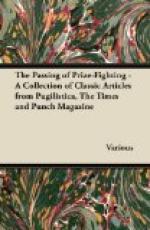There the Labourer shall not half-starve
on “swankey.” and thin pottage,
With a prospect of the Workhouse
when no longer he can work;
But shall have a fragrant pigstye, and
a sanitary cottage,
And a voice in local business
which the big-wigs cannot burke.
The rural working-man shall superintend
his children’s schooling,
And control long ill-used
“charities,” and champion “common
rights,”
And, in fact, there’ll be an end
to Squire’s sole sway and Parson’s fooling,
And the rustic’s sole
hope-beacon shall no more be “London’s
Lights.”
Chorus.—In the Village, new Village, &c., &c.
There the peasant politician with the
Guardian shall grapple,
And keep up the rural standard,
and keep down the local rates;
The haughty Church no longer there shall
lord it o’er the Chapel,
And the Voluntary School shall
find the level it so hates.
In short, with Local Government invested,
the whole Village
Shall grow vigorous, and virtuous,
and prosperous, and proud,
And free from Landlord pressure, and the
Parson’s petty pillage,
The peasants shall no longer
to the slums of London crowd.
Chorus.—From the Village,
new Village, a happy little spot,
A home of peace and plenty, where oppression
may not plot;
Where there’s
room enough for all.
And the “hind”
is not a “thrall,”
In the Village shaped on Democratic lines!
* * * * *
A SAFE NOVEL.
(WITH INTERPOLATED NOTES BY OUR OWN LEGAL ADVISER.)
CHAPTER I.—THE LOVERS’ PARTING.
The sun was setting behind the towers of the church
of
Greenborough-on-the-Driblet.
[It must be clearly and distinctly understood that this village is not intended to refer to any parish with the word “green” introduced in the title—all incumbents of such livings being the most honourable and distinguished of men.]
Two persons were bidding one another adieu. The first was a man in the prime of life wearing a suit of tweeds.
[Please note that the name of the tailor is not given, and it is not to be assumed for a single moment that this refers to any individual in particular.]
The girl, for she was only a girl, wore a costume of almost puritanical simplicity.
[Again no dressmaker is singled out for discussion. It is a purely fancy portrait.]
They were both in tears. For the hour had come for their parting.
[It is necessary to state that by “parting” no reference is made to any existing firm of hair-dressers.]
For a moment they were silent, watching Phoebus as he descended in his glory of purple and gold.
[This refers to the mythical God of Day, and is not to be confounded with a member of a well-known firm of manufacturers of blacking.]




